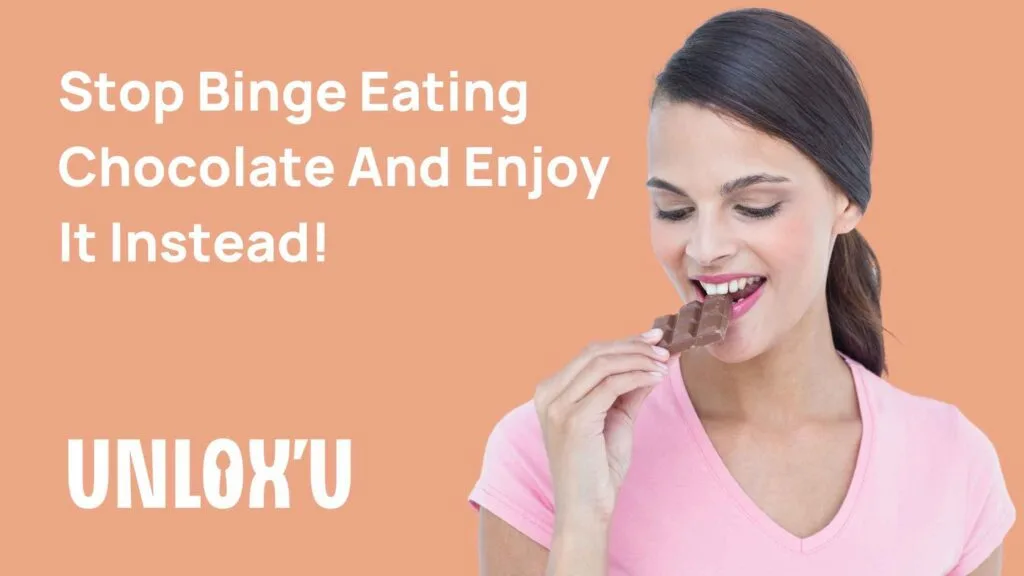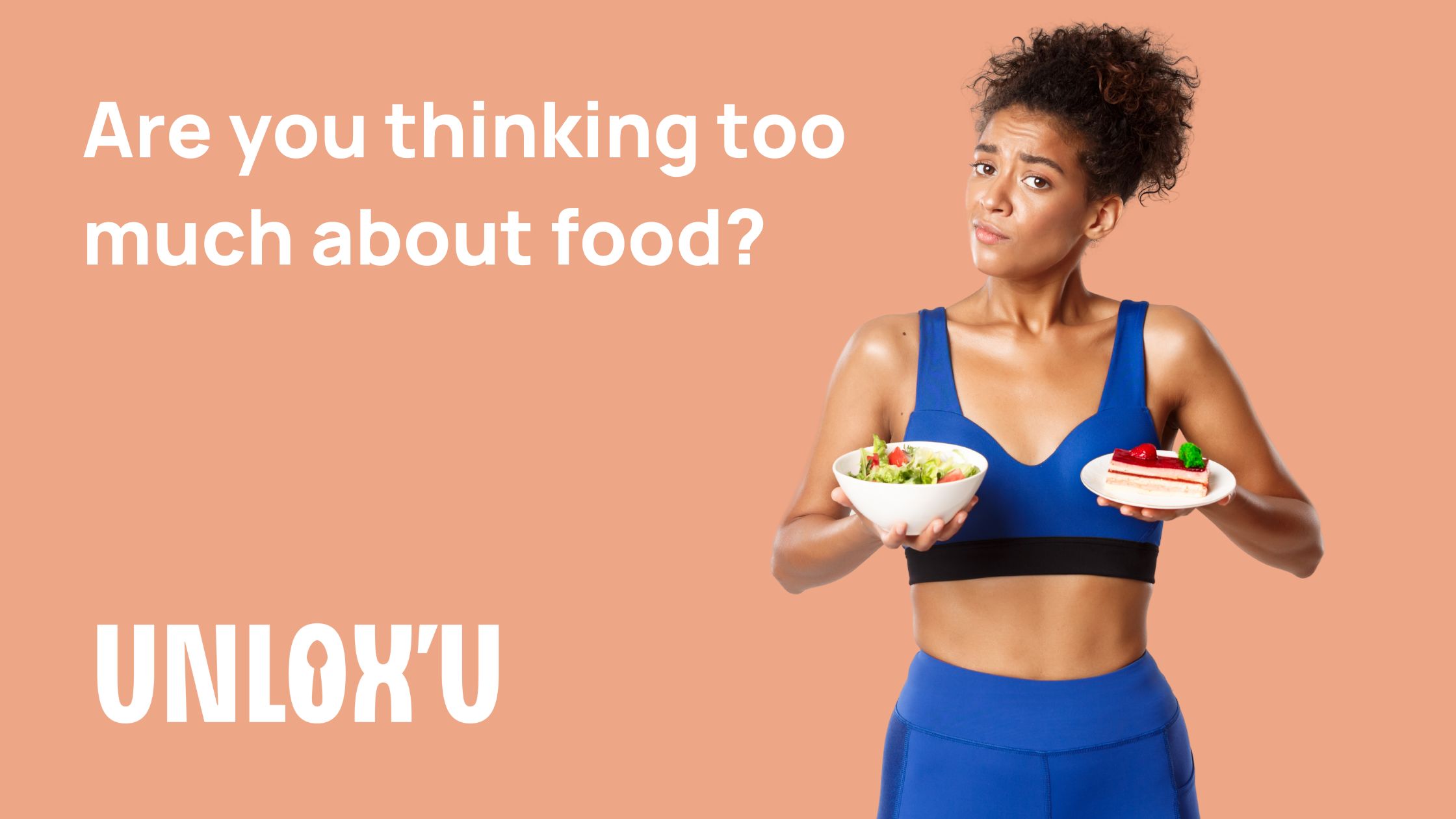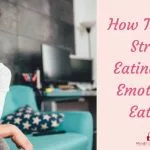Binge Eating on Chocolate – Why It Happens and Practical Ways To Help

“I can’t stop binge eating on chocolate”
Ever felt like you can’t stop binge eating on chocolate?
Then this blog post is for you. Keep reading.
Just ate an entire bar of chocolate?
Have you ever eaten an entire bar of chocolate or asked yourself why is it so difficult to just eat one piece of chocolate? Why do so many of us find ourselves scoffing the entire block? You are not alone. I discuss why this happens, and give you practical suggestions of exactly what can help to have only a few pieces of chocolate without feeling addicted to it.
In this blog, I talk about:
- What is it about chocolate that has such power and control over us?
- Why do we feel addicted to chocolate?
- Are we really addicted to sugar?
- How to eat only a few pieces of chocolate and leave the rest.
Why we binge on chocolate
If you are regularly struggling with binges, then you are probably not only binge eating on chocolate, it will be on other foods, too. It won’t be probably only chocolate. It will be things like lollies, pizza, burgers, chips and even baking chocolate.
We don’t generally binge on carrots, cucumbers and broccoli.
We usually crave and overeat high palatable foods, carbohydrates, and sugary and sweet food. These foods have a specific impact on our brain, how they make us feel, blood sugar and even our gut bacteria.
In my previous blog post: Why I can’t stop eating chocolate once I have started, I am explaining why particularly chocolate is so special and how it’s different to other sweet food.

First, I want to look into some potential aspects of why we crave chocolate in more detail:
Why we experience chocolate cravings – some reasons
Emotional coping Mechanism
Coping mechanisms are ways people develop to deal with trauma, stress, difficult emotions or painful moments in life. Coming mechanisms are important to be able to get through difficult events. However, sometimes coping mechanisms we develop over our lifetime, are creating more damage for us long-term. Therefore, it’s important, once recognised, to adjust the way we manage those difficult and stressful circumstances to be able to maintain emotional well-being.
Chocolate, food, alcohol, drugs or similar substances can be an emotional coping mechanism for some people. For others, it can be screaming, running away, hitting, or getting quiet.
If eating has been your way to comfort, soothe and forget for a moment, you probably have developed a habit of using chocolate as your coping mechanism. While it’s not an ideal way to cope, it’s one that has got you through those hard times.
Food and chocolate are easily available, it doesn’t reject and we have more control over it. We can buy it any time we want, eat it when and as much as we want. On the contrary, other tools might be not as easily available or might feel like require more effort.
Do you use chocolate for comfort and distraction? Do you hide in the car or in the room when nobody is watching to get that relief for a moment? Then maybe chocolate is your coping mechanism.
Habit to eat chocolate for any purpose
Most of our behaviours are learned. Particularly habits are created through repetition.
If you tend to eat chocolate at 3pm in the afternoon or when everybody has gone to bed and you are alone, this has become a habit.
Even a coping mechanism is a habit.
Visual Triggers That Lead To Chocolate Binges
Have you ever seen a delicious cake in a café and ordered it, even though you didn’t have the intention of having a cake before you entered the café?
Or you didn’t even think about food until you came home and saw delicious muffins, warm bread or freshly baked cookies? All these examples demonstrate a visual trigger.
By seeing food, your brain recognises something delicious. It creates a dopamine surge and makes you want to eat it, to satisfy the craving. Again…. Dopamine is in the works. It’s a hormone that is responsible to pursue an activity that predicts pleasure and reward.

Don’t know why you can’t stop eating?
Download the FREE guide to find out which of the 13 underlying triggers lead you to crave food, overeat or binge eat.
How to stop binge eating on chocolate and cravings for sweet food.
Emotional management
If anger, frustration, sadness, boredom or even happiness makes you crave food or chocolate in this case, then emotional management is one of the keys to overcoming eating as an emotional crutch.
Where do we start?
1. Make friends with your emotions. Allow yourself to feel what you feel and practice just experiencing them – without doing anything.
We don’t always need to do anything about our emotions. Trust they will pass and change. They will go as they came.
2. Learn about what your emotions tell you. They are a message that something needs your attention. Maybe it’s time to have that hard conversation you have been avoiding. If it’s time to change a job, start preparing a new CV and just have a look at what’s out there. Have you been bored lately and lost yourself? Write a list of things you could try and start ticking it off.
3. Journal or talk. We can learn a lot about ourselves when we write down what we feel or speak out loud about what is going on for us. Sometimes we feel so overwhelmed, that it’s hard to even understand what we need and want. Reading it back to ourselves or sharing it with another person, can give you lots of insights into what you feel and what you can do about it.
Changing your diet to reduce chocolate binges and sugar cravings
The more sugar we eat, the more sugar we want and crave. Balance your meals by adding protein and fat to every meal. Add fibre in form of vegetables for lunch and dinner. Eat regular meals every 3-4 hours which helps to avoid bingeing, hunger pangs and also stabilise your blood sugar. Be aware of hidden sugars in food. Even bread and canned beans can have added sugar. While it might feel like you are eating healthy, these added sugars will make it harder for you to reduce sugar cravings.
Sugary Drinks and Sugar Substitutes.
Even Coke Zero will continue your sugar addiction. Sugar substitutes, sugar alcohol, and even honey will continue adding to the stimulation of the reward system in your brain. This will continue feeding the addiction to sweet and sugary food.
For the brain, there is no difference between white, brown, coconut sugar or honey. However, there is a difference in nutritional value. Therefore, I suggest opting for honey or maple syrup if you do choose to add sweetness to your baking, porridge or your toast. Honey and maple syrup have minerals and vitamins that processed, white sugar doesn’t have. Dates, fruit, raisins or dried fruit are also great ways to add sweetness to your life.
If you choose sugar-free chocolate, please be aware that it most likely will have sugar substitutes and will not help you to reduce your sugar cravings.
Instead, opt for dark chocolate which will have less sugar and support you to learn to have some chocolate without the need to finish it all.
Eliminate sugar substitutes as they continue feeding the dopamine! Add some sweet potatoes, carrots and fruit to your diet on a regular basis. As discussed above, we are wired to have sweet flavour as part of our diet and there is definitely no need to deprive ourselves of some sweetness in our lives.
Manage your sleep and energy to reduce sugar cravings and chocolate binges
You might have noticed that when you are tired, you are hungrier and crave specifically carbs and sugar.
Pay attention to your sleep patterns, your nighttime routine and your sleep hygiene. Feeling energised and refreshed will help with energy levels and therefore your cravings.
If lack of energy is one of your struggles, ask yourself what contributes to it. If your diet consists of lots of processed simple carbohydrates and sugar, this is an area to look into. Stabilising blood sugar and adding more nutrients to your diet will help you to feel more energised throughout the day and even reduce afternoon slumps.
Some immediate tools to apply to stop binge eating chocolate
- Create portions
- We do better when we have portions. Buy a small bar of chocolate instead of an entire block. If you enjoy ice cream, get one cone instead of an entire container.
- Add dark chocolate to your daily diet
- This trick works really well for my clients. Opt for dark chocolate and add 2 pieces EVERY day. When I say every day, I mean every day. Break those two pieces off and leave them for your favourite time of the day when you usually enjoy some chocolate. Repeat this every day. This will neutralise chocolate and teach your mind to relax around this food. It will understand that it’s always available, it’s no longer scarce and with time, even reduce the need to eat it just because it’s in the pantry.
- Add lemon juice and cinnamon to reduce sugar spikes and reduce cravings
- Add fat and protein to every meal

Schedule your FREE Discovery Call
On this 60-75 minutes call, we will:
Identify your challenges, your history and your goals.
Assess the best approach to stop overeating, food cravings, binge eating and emotional eating.
Create a plan to achieve your food and body goals in an effective and sustainable way.
At the end, we will decide whether we are a good fit to work together to get you from where you are right now to where you want to be.



